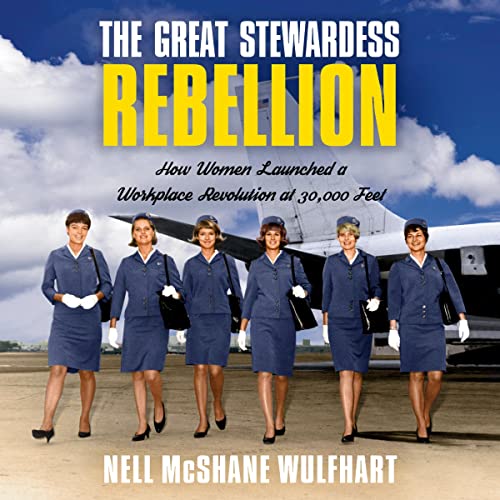A Review of Nell McShane Wulfhart’s “The Great Stewardess Rebellion – How Women Launched a Workplace Revolution at 30,000 feet.”
Imagine a job which promises glamorous travel all over the world. You apply and discover the applicants must be single, white, female, thin, attractive, between the ages of 18-32, and of compliant disposition.
No others need apply.
Once you’ve been employed and after extensive training akin to prepping for a beauty pageant you begin your exciting adventure as a newly minted flight attendant. Imagine having to submit to managers running their hands over your torso to assure you are wearing the required girdle undergarment. Imagine a corporation that encourages sexual harassment of employees by customers. All of this with compensation barely above subsistence levels. Finally, imagine being terminated upon marriage, pregnancy, or weight gain.
Welcome to the 1960s airline attendants’ workplace. Nell McShane Wulfhart’s recount of what happened with labor and women’s rights in the airline industry and American Airlines specifically follows two flight attendants – Patt Gibbs and Tommie Hutto– and their quest for parity with male members of the Transportation Workers Union (TWU). At that time flight attendants were called stewardesses.
While the TWU worked to advocate vigorously for baggage and maintenance workers, they ignored the flight attendants’ grievances. The attitude at the time was that their male members were supporting families, that pay was the primary concern, and flight attendant work was considered temporary.
Yes, a potential tenure of 14 years was considered temporary.
The sexism within the TWU and the airline industry was not lost on the flight attendants who also had union dues taken out of their pay.
Patt persisted to get stewardesses demands for better pay, better conditions, and dropping age, marital status, race, and weight restrictions. Tommie became active in the women’s movement of the 1970s and used coalition building to bring national attention to the plight of stewardesses in arguably the most sexist workplace at the time.
Because the TWU refused to support the stewardesses, those employed by American Airlines eventually broke away and formed their own union, the Association of Professional Flight Attendants. They would battle directly with American Airlines corporate from that time forward. APFA’s ultimate victory included (but not limited to) better pay and schedules, more diversity amongst the cabin crew, and professional safety certification.
Take no prisoners Patt’s and schmoozing Tommie’s journeys spotlight how courage and relentless push for what is an economic, psychological, and moral imperative for these workers positively impacted the airline industry, their rights, and customer safety. Today, flight attendants’ ranks have more gender and racial diversity and can choose this as a lifetime career.
Rebellion is a fast read tracing TWU/APFA’s inner conflicts with a juicy biopic of two women who wouldn’t take no for an answer. It’s informative and will take you on a roller coaster of righteous indignation and laughter while reminding you that the only truly just war is class war, and that women’s rights are workers’ rights and vice versa – important to remember in today’s political climate.
Solidarity and economic justice are for everyone who generates value for their employer. This socially conscious summer read offers a blueprint on how to get, build, and win this in the workplace.







